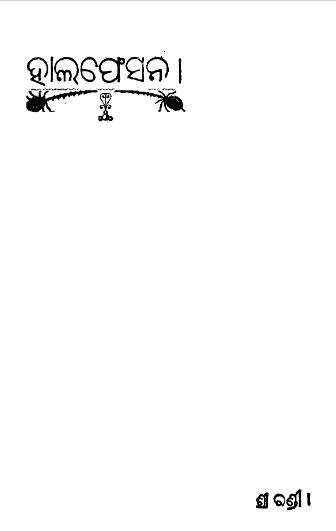Published in 1925, Hal Fesan by Sri Chandi is a delightful work in the genre of parody that offers a humorous yet insightful critique of contemporary society, literature, and cultural norms in Odisha. Known for his sharp wit and keen observational skills, Sri Chandi uses this book to explore the follies and absurdities of life through a lens of satire, employing clever wordplay and inventive storytelling.
Hal Fesan, which translates to The Distorted Truth, aptly describes the essence of the narrative. The book employs parody to mimic and exaggerate the characteristics of various societal elements, including politics, education, and social customs. Through this exaggerated lens, Sri Chandi highlights the contradictions and shortcomings prevalent in society, allowing readers to reflect on these issues in a light-hearted manner.
The structure of the book features a series of interconnected stories or episodes, each focusing on different aspects of life. This episodic format gives Sri Chandi the flexibility to explore various themes while maintaining a cohesive narrative thread. The engaging style keeps readers entertained while prompting deeper contemplation of the issues presented.
One of the central themes of Hal Fesan is the absurdity often found in human behavior and societal norms. Sri Chandi’s characters are exaggerated representations of real-life figures, often indulging in foolishness or hypocrisy that mirrors actual social dynamics. This technique not only provides humor but also encourages readers to recognize and question the absurdities of their own lives.
Sri Chandi skillfully employs literary devices such as irony, hyperbole, and absurdity to enhance the comedic effect of his narrative. For instance, he might portray a learned man who, despite his accolades, is completely out of touch with the realities faced by the common people. Through these figures, the author critiques not only the individuals but also the systems that promote such disparities.
Another significant aspect of the book is its commentary on the literary scene of the time. Sri Chandi parodies the prevalent literary styles, mocking the tendencies of writers to adopt grandiose language while failing to address the more pressing issues of their society. In doing so, he encourages writers and artists to strive for authenticity and relevance in their work, suggesting that true art should engage with the lived experiences of people.
Hal Fesan is also a reflection of the socio-political landscape of Odisha during the early 20th century. With India on the brink of independence, Sri Chandi’s work captures the tensions and aspirations of a society grappling with colonial rule and the quest for cultural identity. By using parody, he not only entertains but also engages readers in critical discussions about nationalism, social justice, and the need for reform.
Through his humor, Sri Chandi creates a space for readers to ponder serious issues while enjoying the light-heartedness of his narratives. The book serves as a reminder that laughter can be a powerful tool for reflection and change.
Books Info
| Books name | Hal Fesan / ହାଲ ଫେସନ |
| Author | Sri Chandi |
| No Of pages | 29 |
| Publisher | Sri Chandi |
| Publication | 1925 |
| Printed At | The Utkal Sahitya Press |
| Distributor | NA |

